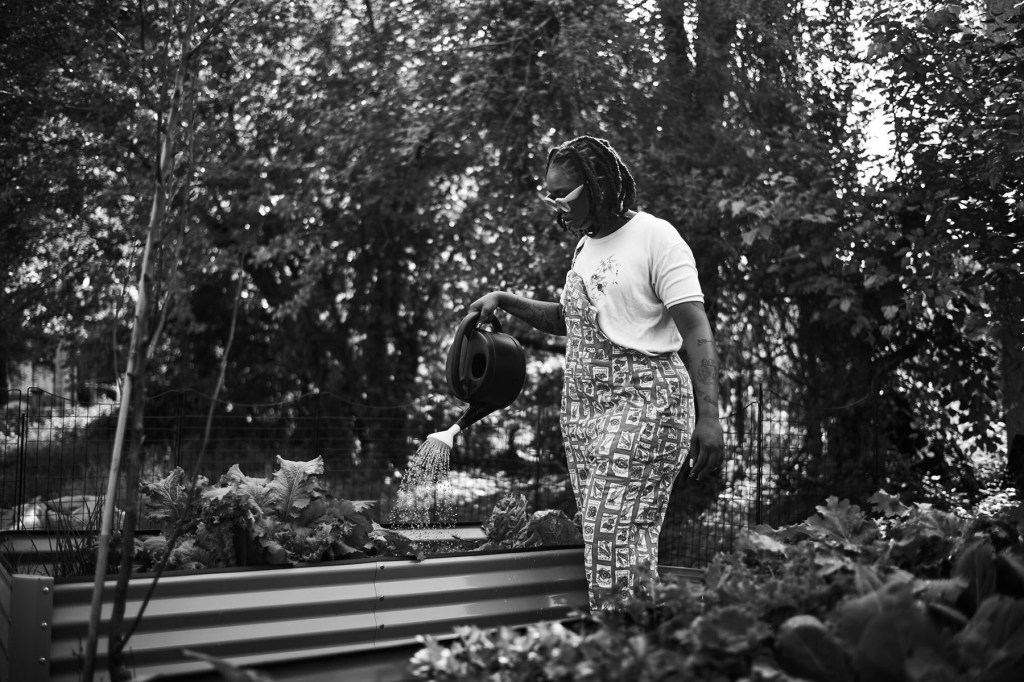After she moved into her first apartment in 2021, a one-bedroom unit in East Baltimore, Saj Dillard realized her rent wouldn’t have gotten her much once her lease ended. The recent college graduate wanted to grow her capital, build wealth and have the chance to own something.
So, she set a goal for herself — when her monstera plant, lovingly named Big Birtha, grew too large to move up flights of stairs to a new apartment, she’d know it was time to find a house to call her own.
“I thought to myself, ‘I’m just giving these people money and I’ll have nothing to show for it when I leave,’” Dillard said.
Two years later, she met with Tonika Garibaldi, program director of Black Women Build-Baltimore, a nonprofit that helps Black women purchase and renovate their own homes in a handful of neighborhoods on the west side of the city.
In less than a month, Dillard learned about the program, previewed a home, put together a savings plan and was under contract, well on her way to achieving her goal. In October 2023, she moved into a brownstone in Upton, a historic neighborhood that was the apex of Black culture in the city in the 1920s. While many residents of all ages and backgrounds live there, vacant homes in need of renovation scatter the neighborhood.
Dillard was the fifth Black woman to buy a home through Black Women Build’s program. Now, 17 women have moved into the Upton, Druid Heights and Poppleton neighborhoods, occupying some of the 21 homes founder Shelley Halstead has renovated since 2019.
“It’s hard to acquire houses if you don’t have the funding and the capital to back it up in the intermediate,” Dillard said. “I think that Black Women Build is bridging that gap between what city officials feel is necessary or needed for the Black community versus what is actually needed for this community.”
In 2015, Halstead was a recent West Baltimore transplant with a background in carpentry and a fresh law degree in hand. While exploring Upton, her new neighborhood, she saw the legacy of redlining and the impact of failed revitalization projects in the 1960s and 1970s that resulted in dilapidated homes, with trees growing out of them and collapsed walls and roofs. Many were slated to be torn down by the city.
But at least some of the units were salvageable, and she saw an opportunity. Halstead decided to put her skills to work. In 2017, she founded Black Women Build, a nonprofit that purchases the homes in Baltimore that are in need of serious work, renovates them and then sells the units at or below the market rate. She began renovating the homes and inviting Black women into the fold to diversify and uplift neighborhoods. In addition to the vacant homes, Halstead saw a lot of opportunity in the area to bring in more businesses and community spaces for her neighbors.
Through the organization, Halstead hoped to help Black women own property, which is often the path to wealth in this country.
“We really strive to make these houses affordable and that’s whether there’s incentives, subsidies or some kind of support, so that you own a house, you have equity and you can think about your next step,” she said. ”It becomes something. Black women don’t always have something to fall back on.”
Halstead figured out which funds were available to help clients purchase the homes and went to work spreading the word about the organization.
Garibaldi guides potential homeowners through creating payment plans and accessing tax credits, seller contributions, down payments and grants provided by the city. Clients can also build skills in carpentry and other building trades, like mechanical, electrical and plumbing, or take community-building and organizing classes.
Black people are less likely to own homes than any other major racial or ethnic group in America; just 44 percent own a home, according to the National Association of Realtors (NAR). The association reported that the average maximum price a first-time Black home buyer can afford is $229,000; in Baltimore, Redfin reported that the average single-family home is $355,000, up 6.8 percent since last year.
Organizations like Black Women Build are clearing the way for more Black women — who are more likely to have low-wage jobs, student loans and other debt — to own homes and build wealth.
While renovating her second property in 2020, Garibaldi needed some advice, and by fate, ended up in the right place. After listening to Halstead pitch her idea for the nonprofit at a housing event, Garibaldi immediately got on board and began to volunteer. After hopping around with different gigs in photography for a while, she was happy to find a job that offered the potential to make a difference in the community.
Since joining the team, one thing that has surprised Garibaldi is that, financially, not everyone is ready to be a homeowner, although they may want to be one. She worked with a potential buyer who had 10 credit cards, and with persistence, the client was able to become qualified to purchase a home.
Watching clients pay off their debt gives Garibaldi joy because “they can move forward and not be held back,” she said.
Even though she only had a $35,000 salary at the time of purchasing her home, Dillard, a community food access coordinator, received $45,000 in grants as a first-time homeowner and agreed to remain the primary resident of her home for five years. In the end, she purchased her home for $120,000.
“You don’t have to be rich, or have a million dollars saved,” Dillard said. “You don’t have to be working a six-figure job to be a homeowner or to have any type of assets. Black Women Build is making that possible, and that’s amazing.”

(Courtesy of Tonika Garibaldi)
In exchange for the backing of Black Women Build, the homeowners bring their sets of skills to the neighborhood and foster community. Dillard bought a plot of land near her house for $500 and established Sajeeda Urban Farm, where she grows crops that are free for her neighbors, who had helped build her garden. Also a beekeeper, Dillard hosts workshops to teach her community how to conduct hive inspections, for instance, and consults with those who want to start a farm of their own.
With the help of some grant money, Dillard set up planter boxes along Etting and Laurens streets because some of her neighbors wanted to exercise their green thumbs. She and Garibaldi provided soil, seeds and other gardening supplies. One of Dillard’s neighbors helped her paint them; her boxes are green and her neighbors’ are pink.
Every month, homeowners host dinners and meetings in the organization’s office. Day-to-day, it serves as a community space where homeowners talk about projects, study and hang out. During the latest meeting, Garibaldi said, the office felt too small because there were so many people in attendance — but having grown up in a large family, she loves to see this happening.
“I just love being around Black women and helping them,” she said. “I can see myself in all of them and I really want to support them. I want them to be successful.”
Getting to this point hasn’t always been easy, Garibaldi said.
After renovating the block of two-story homes on Etting Street, the first crop of homes the organization purchased for $5,000, Halstead didn’t break even. It was also difficult to identify comparable units because there weren’t any completed homes yet. Renovations for these homes totaled around $120,000 to $130,000.
While money from private donors funds renovations, and homeowners assist with the small team’s salaries, as material costs became more expensive, the organization’s finances grew tighter. Fully renovated, three-story homes on Division Street purchased by clients and grants from the city have helped sustain the organization.
Halstead is still hoping for more support from the city as well, something that has been a challenge for her young organization. She also wants her neighbors’ voices, opinions and experiences reflected in the city’s revitalization efforts.
Halstead worries that the assault on diversity, equity and inclusion programs could scare away potential donors since her organization specifically serves Black women. She also worries about the future of the social safety net, as the Trump administration and a Republican-led Congress restrict eligibility for programs like Medicaid.
“I wake up every day and read the news, and it’s really depressing,” Halstead said. “To say that people don’t deserve that safety net because they’re not working enough, they’re not working or they’re low-income, whatever it is, to me that’s really unacceptable. That’s not the kind of world we’re trying to create.”
Almost two years after moving in, Big Birtha sits happily in her corner of Dillard’s new home, surrounded by her plant siblings. Dillard works as a contract volunteer to give back to the organization by working tables at various events and bringing in potential neighbors.

(Courtesy of Saj Dillard)
Dillard said that the fact that she isn’t alone gives her hope. When late-night disturbances or other troubles arise in her neighborhood, she has Garibaldi, the organization and her neighbors to lean on. In her work, Dillard listens to the needs of her community — they know they can depend on her as well.
And the organization continues to grow. Four new homeowners are under contract, and Halstead is renovating 20 more homes across Baltimore. In addition to the nonprofit’s work, she is building mixed-use spaces and a community center in the Marble Hill historic district.
When she thinks about her work and how her identity defines it, Halstead points to Virginia Woolf’s essay “A Room of One’s Own” — “What could women create if they were able to have a room, shut the door and explore what they wanted to?”
By creating a seat at the table, she, her colleagues and clients have been able to see what types of changes are possible in their community. When she began pitching the idea of Black Women Build to others, they all told Halstead she wouldn’t be able to do it. Since then, she has focused on doing the work so it can speak for itself.
“We have to insert ourselves,” she said. “Once we become homeowners and we have 30 or 40 houses done, that’s when your councilperson should have their ears perked up. And that is going to happen. That responsiveness of the city, we’ll start to see that a little more.”
Great Job Eden Turner & the Team @ The 19th Source link for sharing this story.




